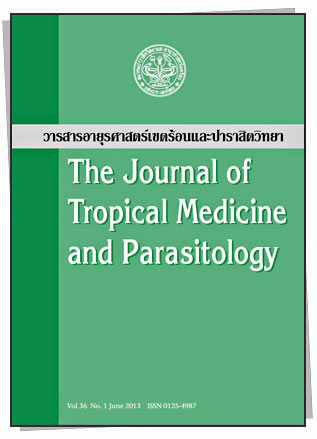Laboratory Evaluation of Temephos, Grass Infusion, and Piper aduncum Extracts against the Ovipository Responses of Aedes aegypti
Main Article Content
Abstract
Abstract
The objective of this study was to evaluate the effect of Temephos, grass infusion, and Piper aduncum extracts, against the ovipository activity of Aedes aegypti (L) in the laboratory. Three concentrations of Temephos and P. aduncum extracts (0.1 ppm, 0.5 ppm, and 1.0 ppm), and grass infusion (10%, 25%, and 50%) were used. Ae. aegypti laid significantly more eggs in ovitraps treated with grass infusion (p < 0.05) than in ovitraps with distilled water, and in ovitraps with P. aduncum extract. Oviposition Activity Index (OAI) values for the grass infusion were +0.60, +0.65, +0.62, for Temephos +0.28, -0.10, +0.47, and for P. aduncum +0.21, +0.20, +0.07, respectively. There were no significant differences between the percentages of hatchable eggs with treatments at three concentrations (p > 0.05, p = 0.84, 0.86, 0.66), and among three concentrations of grass infusion, Temephos and P. aduncum extracts (p > 0.05, p = 0.15, 0.22, 0.68), respectively; this indicated that there was no ovicidal effect on Ae. aegypti eggs. The residual effects of 10% grass infusion remained good for 50 days, 50% grass infusion for 40 days, P. aduncum 0.1 ppm until 10 days, 1.0 ppm for 70 days, while Temephos 0.1 ppm was effective for 20 days, and Temephos 1.0 ppm 50 days. In conclusion, extracts of P. aduncum 1.0 ppm were repellent against the oviposition of Ae. Aegypti, while the grass infusion was attractant.
Keywords: Aedes aegypti, Piper aduncum, oviposition, ovitraps, Temephos

